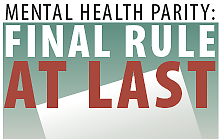The White House Mental Health and Substance Use Disorder Parity Task Force issued a “Final Report...
Insurers Must Cover Intermediate Care Levels, Provide Transparency to Patients, Parity Rule States
 |
In a significant step forward for patients receiving mental health care, the final rule to implement the federal parity law, issued on Friday, says that insurers must provide their beneficiaries with the medical necessity standards and the processes—such as concurrent review and prior authorization—that the insurer uses to implement them.
In addition, the final rule clarifies that the classification of benefits defined in the Mental Health Parity and Addiction Equity Act was never intended to exclude intermediate levels of care, such as intensive outpatient, partial hospitalization, and residential treatment.
The law stipulates six classification of benefits—inpatient in and out of network, outpatient in and out of network, emergency care, and prescription drugs—but it was unclear what the status of certain intermediate levels of care might be under the law. The final rule clarifies that plans must assign intermediate services in the behavioral health area to the same classification as plans or issuers assigned intermediate levels of services for medical/surgical conditions, according to a preliminary analysis of the rule by APA.
The final rule is effective for plan years beginning on or after July 1, 2014. In practice, the bulk of plan years end December 31, so the effective date for most plans will be January 1, 2015.
“People with mental illness have long faced discrimination in health care through unjust and often illegal barriers to care,” said APA President Jeffrey Lieberman, M.D., in response to the rule. “The final rule provides a crucial step forward to ensure that consumers receive the benefits they deserve and are entitled to under the law. In addition to providing equal benefits for mental illness as physical illness, I am hopeful that there will be strong monitoring and enforcement at both the state and federal levels."
“As we review the final rule [http://www.dol.gov/ebsa/pdf/mhpaeafinalrule.pdf], we look forward to a new chapter in mental health care that delivers on the promise of the parity law. APA will remain vigilant and continue working toward full equity for people with mental illnesses and substance use disorders,” Lieberman said.
Join the parity conversation by following @APAPsychiatric and #mhparity.





